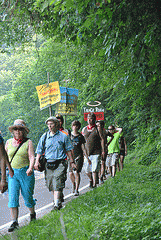Blair Mountain, West Virginia:
The roads were narrow.
We sweltered
with temperatures in the mid '90s, and took to the ditches as loaded
coal trucks passed so close we could feel the acrid breeze. Weary and
blistered from a ten-mile daily trek, we found that campsites for
hundreds of marchers, night after night, were withdrawn under pressure
from coal industry powers -"... Sorry ma'am, if you let 'em camp on your property we can't guarantee your husband's job..."
So we called in vehicles & drivers to shuttle back over the mountain to Marmet where we slept ear to ear and toe to toe on a warehouse floor for all but the last night of the arduous and epic five-day, fifty mile march from Marmet to Blair Mountain, WV.
Despite the obstacles, we grew in numbers, in determination and in discipline as a nonviolent battalion of collectively organized activists, young and older, experienced and new to activism, historians and environmentalists. We sweated and marched for the preservation of the historic Blair Mountain and an end to the devastation and disgrace of mountain top removal coal mining.
Alpha Natural Resources and Arch Coal own much of the historic Blair Mountain, site of the 1921 battle for union rights, a heroic struggle still remembered by many residents of the coal towns of rural WV. Descendants of these early UMW union organizers joined the March to Blair to preserve this important part of WV history and indeed their very homes and communities. By the time we ascended Blair Mountain we were over 1,000 strong singing as we climbed.
It is a race against time to suspend the U.S. Army Corps of Engineers mining permits that enable the coal companies to "surgically remove" historic locations on Blair Mountain by blowing up the sites where major labor battles were fought: No history, no preservation.
Memorial lettered by Coleman for the Blair Art Build
Arch Coal recently purchased Massey Energy. Massey / Alpha are responsible for the vast majority of Mountain Top Removal coal mining occurring in Appalachia. The company has an an abysmal safety record, and was cited for 3,007 safety violations that led to the explosion in the Upper Big Branch mine, causing the wrongful deaths, some would say murder, of 29 mine workers in April 2010.
At a Subway near the town of Marmet, the young sandwich maker told us that his uncle and two cousins had been found huddled together, arms entwined, inside the Upper Big Branch mine after the fatal blast. With that story, he conveyed the depth of suffering borne by the coal mine workers and their families as he slathered on the mayonnaise and rang up the sale.
Many of the heroes of this March on Blair are the scores of volunteers who provided essential services under difficult, often changing circumstances as we moved through what can only be termed as hostile territory. Even so, as marchers traveled along the treacherous highway, seven to eight passersby out of every ten gave friendly honks, raised clenched fists, and gestured with peace signs and thumbs up. Some offered water from a garden hose. One man, sitting astride his lawn mower in his driveway, held a thank you sign and a bunch of flowers. As we passed he offered these encouraging words, "There's more of us here than you think."
Yet the deeper we marched into coal country, entire families came out on their porches, lined the roadside or stood in their yards as we passed. Many held homemade signs and shouted epithets, clearly feeling that we represented a threat to their very livelihood. "Coal keeps the lights on," was a familiar theme, though much of the metallurgical coal extracted from WV is shipped to China for making steel.
Katuah EF! members and other volunteers worked non-stop to provide water to the marchers, hauling the trailer over the hazardous roads and setting up fill-up stations & water drops along the way. Others took a turn driving the trailer with the three Porta Johns that serviced us throughout the week.
(Note: You can view every article as one long page if you sign up as an Advocate Member, or higher).






